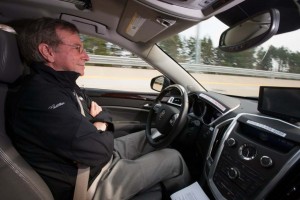
General Motors researchers, such as Innovation Program Manager Jeremy Salinger, are studying driver behavior in semi-autonomous driving situations.
They’ve long been fodder for science fiction writers but self-driving cars may very well become reality in the relatively near future. But what will that mean for the driver – or at least the person actually sitting behind the wheel?
Forget drinking. That’s specifically banned by the new autonomous vehicle “operator’s license” recently introduced in Nevada. And catching up on your texts and tweets will likely also get you a ticket. If anything, you’ll be required to keep your eyes on the road – but your hands off the wheel – just in case you have to step in during an emergency.
Or so the laws are likely to require as other states copy Nevada’s lead and implement autonomous driving laws of their own.
The problem is how to maintain an operator’s license when, in all likelihood, they’ll just be along for the ride most of the time. That’s something General Motors is looking into as part of a new study.
The research is primarily focused on driver behavior inside semi-autonomous, self-steering vehicles. That reflects the fact that the technology of the Jetsons will likely roll out in stages. In fact, a number of vehicles, such as the latest-generation BMW 7-Series, offer radar-guided collision avoidance systems that can autonomously slow and even stop a vehicle if it appears the driver won’t react in time to prevent an accident. Volvo’s latest version of its City Safe technology can spot a pedestrian walking into the path of a vehicle and quickly bring it to a stop.
Self-steering appears to be the next big frontier, GM’s Cadillac brand already testing a version of that technology at the company’s proving grounds in Milford, Michigan.
As that might imply, one of the most important duties demanded of a driver will largely go away. So, how to maintain the attention of someone simply sitting in the driver’s seat just in case there’s a problem?
The AAA Foundation’s 2011 Traffic Safety Culture Index already revealed that a full one-third of drivers admit to texting or e-mailing while behind the wheel. No surprise experts fear that rate will increase when a driver really isn’t driving most of the time.
“People have dreamed of having self-driving cars for decades, but having that capability will be a major adjustment for people when it is first introduced,” said John Capp, GM director of Global Active Safety Electronics and Innovation. “This study is helping GM and its research partners determine the best methods for keeping drivers engaged.”
One possibility would be to actual ramp up the number of warnings a driver gets from safety systems like Forward Collision Alert, to draw their eyes back to the road, researchers suggest. Cadillac recently unveiled a new Driver Assistance Package that uses a vibrating seat to warn the driver of trouble and point out which direction it is coming from.
Despite such concerns, If anything, researchers believe automation is likely to improve overall road safety.
“Drivers are already engaging in risky behavior, and are likely to continue doing so given the prevalence of smartphones and other portable electronics, so why not make it safer for them and the people around them,” said Dr. Eddy Llaneras, principal investigator at Virginia Tech Transportation Institute on the GM study. “Offering some form of vehicle automation with the proper safeguards might be better than what is happening on our roads today.”

The idea of a self driving car doesn’t concern me in and of itself. What does concern me is the thought of self driving cars mixing with all the non-self driving cars in traffic. How well is that going to work? What are the issues going to be around that? How will human drivers respond to the way self driving cars behave? What kind of situations are unforeseen by the people who are developing the self driving software? Just as a quick example, I like to use cruise control on the interstate. But I am seldom able to because of how erratic everyone around me drives – speed up, slow down, drive at a constant speed different than my own, change lanes, etc. I think Nevada and the promoters of self driving cars may be jumping the gun a bit. But, then again, maybe not.
Hi, Bryan,
Valid points…but all reasons for the increased testing now underway…and the special licensing requirements.
Paul E.